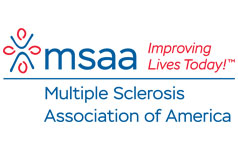The Results of MSAA’s Survey on MS Relapses
The understanding and treatment of multiple sclerosis (MS) has advanced rapidly over recent years. More FDA-approved disease-modifying therapies (DMTs) are now available than ever before. These treatments have been scientifically proven to slow disease progression, lessen MRI activity, and reduce relapses. While these treatments have proven effective in slowing the course of the disease, a cure has yet to be found.
A feature of the most common form of MS, relapsing-remitting MS (RRMS), is the periodic flare-ups or exacerbations of existing symptoms, or the appearance of new symptoms. This is commonly referred to as a relapse. Each of the DMTs currently available have demonstrated its effectiveness in reducing the number of relapses by 30 to 50 percent, but relapses can still occur in people with RRMS.
Relapses occur without warning, and depending on the individual symptoms, can greatly impact one’s ability to perform everyday tasks. Recognizing and appropriately treating an MS relapse can be vital to daily activities and quality of life.
In October 2011, MSAA conducted an email survey of its clients to better understand their experiences in managing their relapses. More than 2,500 people responded to this survey. This tremendous response has led to several MSAA program initiatives, all focused on relapse identification and management.
Of those responding:
- 77 percent were women
- 64 percent were between the ages of 40-59
- 76 percent identified themselves as having a form of relapsing MS
- 18 percent were diagnosed two years or less before completing the survey, while 36 percent received their diagnosis more than 10 years prior
- 75 percent were taking a DMT at the time of the survey, 25 percent were not
Relapses in the population surveyed continued to occur with some frequency. While 25 percent indicated they were relapse-free during the three years prior to the survey, 65 percent had at least one relapse, and 29 percent reported experiencing three or more relapses during the three years prior to the survey.

Of concern is the fact that 25 percent of those who reported experiencing a relapse in the previous three years also reported that these relapses went untreated. Hopefully these individuals were experiencing a mild relapse, in which case a physician may opt to reserve treatment for a more severe bout with symptoms; or maybe some of these individuals did not inform their doctor that they were experiencing a relapse. As noted in the following paragraph, however, only 8 percent of those responding to the survey felt that their relapses had little or no effect, so one can only conclude that the majority of these untreated relapses could have been treated, providing some relief to the patient.
Depending on the severity and type of symptoms experienced by an individual with MS during a relapse, these can have a profound effect on daily activities and overall function. A total of 65 percent responded “great” or “quite a bit” to the degree of impact these relapse symptoms had on daily lives, while only 8 percent stated that their relapses had little or no effect.
Even when treated, those surveyed reported a significant variation in the impact those treatments had on improving their symptoms. A number of options are available to physicians and patients for treating an MS relapse. The most common treatment is with steroids to reduce the inflammation associated with a relapse. Steroids can be administered via infusion or orally.
Most of the respondents reported being treated only with IV steroids during their most recent relapse. Twice as many patients (42.7 percent) were treated by IV infusion compared to those only receiving oral steroids (21.5 percent). A total of 12 percent reported being treated with a combination of IV steroids with an oral taper.
A much smaller percentage of those responding to our survey were treated with other options. Only 2.4 percent of those who responded received the FDA-approved medication Acthar® Gel (adrenocorticotropin [ACTH]) as their most-recent treatment for a relapse. Even fewer patients were treated with plasmapheresis (plasma exchange or “PE”) or intravenous immunoglobulin (IVIG).
A wide disparity was reported in the impact these treatments had in improving the symptoms of a relapse. Almost half (47 percent) felt the treatment “did nothing” or “somewhat” improved their relapse symptoms, while 44 percent felt their symptoms were greatly improved or completely eliminated. The remaining 9 percent could not recall.
MS RELAPSE IDENTIFICATION and MANAGEMENT SURVEY
Which treatment did you take for your last relapse where treatment was required?
| Answer Options | Response Percent | Response Count |
| IV steroid infusion | 42.7% | 566 |
| Oral steroid tablets (only) | 21.5% | 284 |
| Oral steroid tablets (after IV steroids) | 12.0% | 159 |
| Acthar/ACTH injections | 2.4% | 32 |
| IVIG | 1.0% | 13 |
| Plasma exchange/Plasmapheresis | 0.5% | 6 |
| Not sure | 19.9% | 264 |
| Other (please specify) | 174 | |
| answered question 1324 skipped question 1361 |
||

How much do you think the treatment for your most recent relapse resulted in improvement of your relapse symptoms?
| Answer Options | Response Percent | Response Count |
| The treatment did nothing to improve my symptoms | 11.3% | 150 |
| The treatment somewhat improved my symptoms | 35.6% | 471 |
| The treatment greatly improved my symptoms | 35.0% | 464 |
| The treatment completely eliminated my symptoms | 8.5% | 113 |
| Do not recall | 9.5% | 126 |
| answered question 1324 skipped question 1361 |
||














